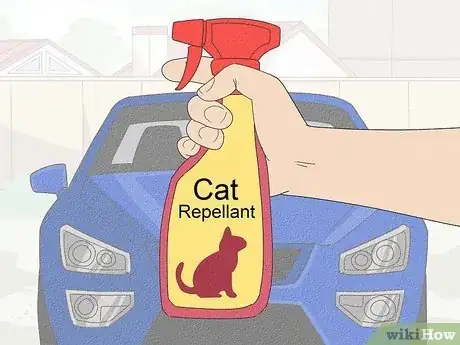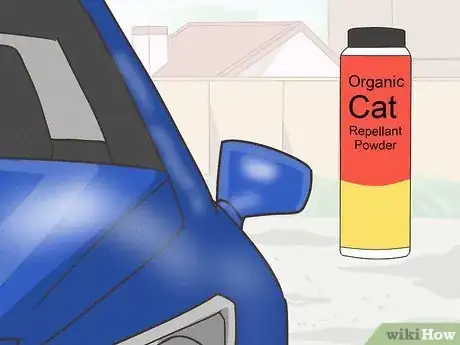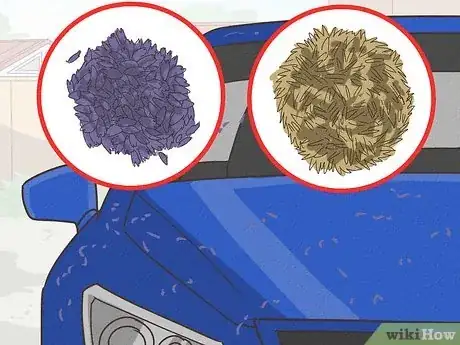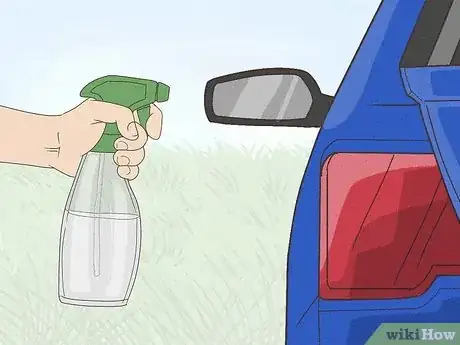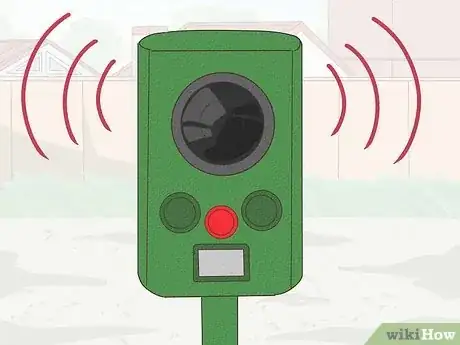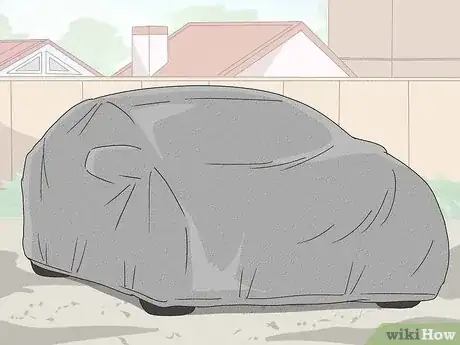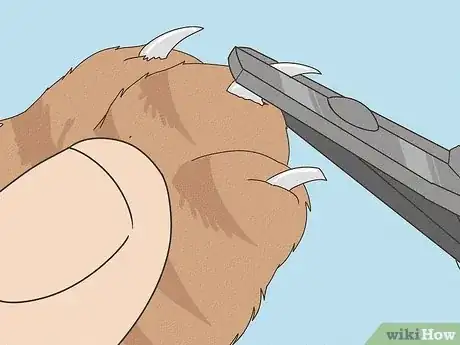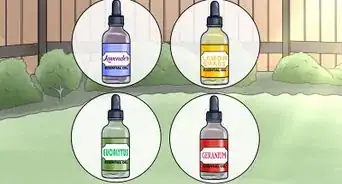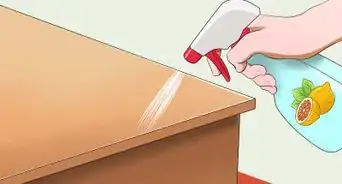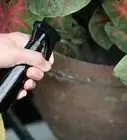This article was co-authored by Jessica Char and by wikiHow staff writer, Glenn Carreau. Jessica Char is a Cat and Dog Trainer, Behavior Consultant, and the Founder of Feline Engineering and Canine Engineering. She specializes in modifying challenging pet behavior problems, such as fear and aggression, using positive reinforcement training protocols. Jessica is a Certified Fear Free Trainer, a Certified Professional Dog Trainer, and a Certified Separation Anxiety Trainer. She is also a member of the International Association of Animal Behavior Consultants. Jessica received her BS and MS in Biomedical Engineering from Washington University in St. Louis.
There are 9 references cited in this article, which can be found at the bottom of the page.
This article has been viewed 185,200 times.
Even if you're a total cat-lover, waking up to find paw prints or scratches on your car can be pretty frustrating. Whether the perpetrator is your cat, a neighborhood kitty, or a stray, there are plenty of effective and humane ways to keep cats off your car and stop them from endangering themselves by climbing into the car's engine. Read on for a complete list of solutions to deter cats without hurting them and minimize scratch damage from any cats that slip past your defenses.
Things You Should Know
- Use natural repellents, including cat repellent spray, dried lavender, rue, rosemary, or thyme, cayenne pepper, and white vinegar.
- Install a motion-activated sprinkler or ultrasonic repeller to scare the cat away when you're not there. Otherwise, protect the vehicle with a car cover.
- Clear any food scraps away from the car so cats won’t smell them. Park your car in a garage or shaded area whenever possible to deter cats.
Steps
Expert Q&A
-
QuestionWhat is the most effective cat repellent?
 Jessica CharJessica Char is a Cat and Dog Trainer, Behavior Consultant, and the Founder of Feline Engineering and Canine Engineering. She specializes in modifying challenging pet behavior problems, such as fear and aggression, using positive reinforcement training protocols. Jessica is a Certified Fear Free Trainer, a Certified Professional Dog Trainer, and a Certified Separation Anxiety Trainer. She is also a member of the International Association of Animal Behavior Consultants. Jessica received her BS and MS in Biomedical Engineering from Washington University in St. Louis.
Jessica CharJessica Char is a Cat and Dog Trainer, Behavior Consultant, and the Founder of Feline Engineering and Canine Engineering. She specializes in modifying challenging pet behavior problems, such as fear and aggression, using positive reinforcement training protocols. Jessica is a Certified Fear Free Trainer, a Certified Professional Dog Trainer, and a Certified Separation Anxiety Trainer. She is also a member of the International Association of Animal Behavior Consultants. Jessica received her BS and MS in Biomedical Engineering from Washington University in St. Louis.
Cat & Dog Behavior Consultant If your pets aren't in the area, but you're trying to deter wildlife or outdoor cats, you can get a motion activated sprinkler that goes off when something enters your yard. Something like that can also help deter those unwanted visitors in your garage.
If your pets aren't in the area, but you're trying to deter wildlife or outdoor cats, you can get a motion activated sprinkler that goes off when something enters your yard. Something like that can also help deter those unwanted visitors in your garage. -
QuestionHow do I stop my cat from jumping on my car?
 Jessica CharJessica Char is a Cat and Dog Trainer, Behavior Consultant, and the Founder of Feline Engineering and Canine Engineering. She specializes in modifying challenging pet behavior problems, such as fear and aggression, using positive reinforcement training protocols. Jessica is a Certified Fear Free Trainer, a Certified Professional Dog Trainer, and a Certified Separation Anxiety Trainer. She is also a member of the International Association of Animal Behavior Consultants. Jessica received her BS and MS in Biomedical Engineering from Washington University in St. Louis.
Jessica CharJessica Char is a Cat and Dog Trainer, Behavior Consultant, and the Founder of Feline Engineering and Canine Engineering. She specializes in modifying challenging pet behavior problems, such as fear and aggression, using positive reinforcement training protocols. Jessica is a Certified Fear Free Trainer, a Certified Professional Dog Trainer, and a Certified Separation Anxiety Trainer. She is also a member of the International Association of Animal Behavior Consultants. Jessica received her BS and MS in Biomedical Engineering from Washington University in St. Louis.
Cat & Dog Behavior Consultant Understand that cats like being in high places. Try to understand what your cat gets from this experience and help him get it from another place. You could also add something uncomfortable to keep him out of the car hood.
Understand that cats like being in high places. Try to understand what your cat gets from this experience and help him get it from another place. You could also add something uncomfortable to keep him out of the car hood. -
QuestionHow do I keep cat off the soft top roof of my car?
 Community AnswerCats don't like the smell of citrus. You can make a homemade spray of water and orange essential oil and spritz the top of your car at the end of the day. You can buy sprays too, but they're basically the same thing, just more expensive.
Community AnswerCats don't like the smell of citrus. You can make a homemade spray of water and orange essential oil and spritz the top of your car at the end of the day. You can buy sprays too, but they're basically the same thing, just more expensive.
Warnings
- Many people resort to mothballs as a cat repellant since cats don't like the smell. However, mothball fumes are toxic to cats (and humans), so using them isn't recommended. Mothballs are only supposed to be used in airtight spaces like a garment bag, where nobody can breathe their fumes.[14]⧼thumbs_response⧽
References
- ↑ Jessica Char. Cat & Dog Behavior Consultant. Expert Interview. 28 September 2021.
- ↑ https://hssaz.org/wp-content/uploads/2021/03/No-Kill-Pima-County-Humane-Cat-Deterrent-Flier.pdf
- ↑ https://www.multcopets.org/keeping-cats-out-gardens
- ↑ https://hssaz.org/wp-content/uploads/2021/03/No-Kill-Pima-County-Humane-Cat-Deterrent-Flier.pdf
- ↑ https://pets.thenest.com/use-vinegar-cat-repellent-5829.html
- ↑ https://www.alleycat.org/resources/how-to-live-with-cats-in-your-neighborhood/
- ↑ https://www.alleycat.org/resources/how-to-live-with-cats-in-your-neighborhood/
- ↑ https://www.alleycat.org/resources/how-to-live-with-cats-in-your-neighborhood/
- ↑ https://www.alleycat.org/resources/how-to-live-with-cats-in-your-neighborhood/
- ↑ https://www.alleycat.org/resources/how-to-live-with-cats-in-your-neighborhood/
- ↑ https://www.humanesociety.org/resources/trimming-cats-claws
- ↑ https://www.animalhumanesociety.org/behavior/keeping-your-cat-counter
- ↑ https://animals.mom.com/how-to-keep-a-cat-from-sitting-on-my-car-8436454.html
- ↑ https://extension.oregonstate.edu/news/there-are-alternatives-dangers-mothballs
About This Article
To keep cats off your car, mix peppermint or orange essential oil with 3 parts water in a spray bottle. Then, spray the mixture around your car, or soak cotton balls in the mixture and put them around it. You can also try sprinkling dry rosemary or lavender around, since cats don't like these smells either. Alternatively, buy and use an all-natural cat repellent spray, which won’t damage paint, or a cat-repellent powder. Just be aware that dry herbs or powders can blow away, so you may be better off using a homemade or store-bought spray. To learn how to prevent cats from scratching your car, read on!
